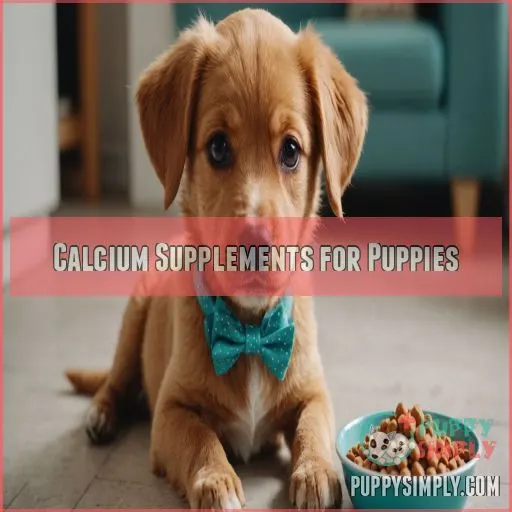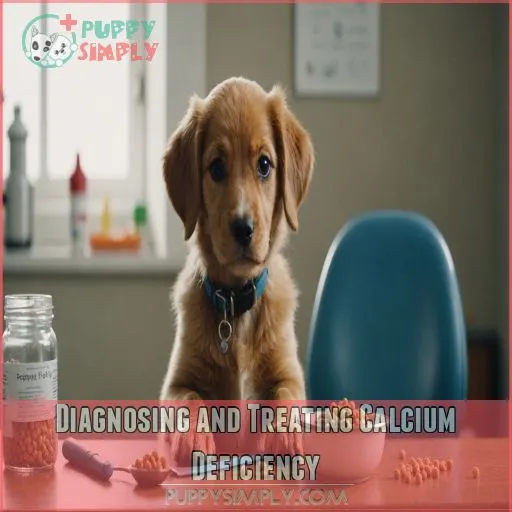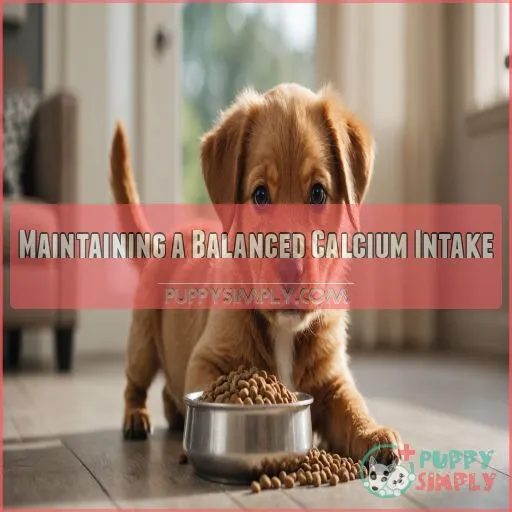This site is supported by our readers. We may earn a commission, at no cost to you, if you purchase through links.

Look for foods suited to your pup’s age and breed, packed with the right amount of calcium to power their wagging tails. Just remember, more isn’t always merrier—too much calcium can stir trouble. Think of it like seasoning a soup; a pinch is perfect, but a handful might spoil it!
Curious about the best way to keep your puppy healthy? Stay tuned for more insights!
Table Of Contents
- Key Takeaways
- Calcium-Rich Puppy Food
- Choosing the Right Puppy Food
- Puppy Food With Calcium Boost
- Calcium-Rich Foods for Puppies
- Feeding Calcium-Rich Foods to Puppies
- Calcium Supplements for Puppies
- Common Health Issues in Puppies
- Diagnosing and Treating Calcium Deficiency
- Maintaining a Balanced Calcium Intake
- Veterinary Consultation and Recommendations
- Frequently Asked Questions (FAQs)
- Conclusion
Key Takeaways
- Choosing calcium-rich puppy food is crucial for strong bones and muscle development. It’s like picking the right shoes for a marathon—vital for your pup’s energy and growth. But remember, just like too much cake isn’t great for your waistline, too much calcium can cause issues like kidney stones.
- Always consider your pup’s unique needs when picking food. Think about their age, breed, and activity level—kind of like fitting puzzle pieces together for the perfect picture of health. And don’t forget to chat with your vet; they’re the GPS guiding you through your puppy’s nutritional needs.
- Natural sources like yogurt, cheese, and fish can boost your puppy’s calcium intake. Just be careful with portions—no one wants a pup waddling around like it’s wearing oversized boots! Homemade meals are great, but make sure they’re balanced and safe.
- Regular vet check-ups are your best friend. They’re like that proactive friend who reminds you to stay on track, ensuring calcium levels are just right—not too low to cause bone issues, and not too high to lead to health problems. Follow this roadmap and your furry friend will be thanking you with tail wags galore!
Calcium-Rich Puppy Food
Calcium isn’t just for building strong bones; it keeps your puppy’s muscles and nerves zipping along smoothly, too.
Without enough calcium, puppies could end up wobbling around like a toddler in roller skates, so it’s essential to find the right food to support their growth.
Benefits of Calcium for Puppies
Without enough calcium, puppies may struggle with healthy growth and muscle function. Consider including calcium-rich snacks and puppy food, ensuring your furry friend’s calcium needs are met for preventing hypocalcemia.
Importance of Calcium for Strong Bones
Boosting bone health, calcium is really important for your pup’s development.
It’s like having a sturdy foundation for a house—essential for supporting bone growth.
Choose puppy food with calcium boost!
Role of Calcium in Muscle and Nerve Function
Calcium is really important for your pup’s muscle and nerve function.
It helps prevent muscle twitches, weakness, and even seizures.
Make sure your puppy gets enough calcium-rich foods like yogurt, cheese, and fish.
Recommended Daily Calcium Intake for Puppies
Regarding calcium intake, puppy needs vary by age and breed. Generally, aim for 320 mg of calcium per 1000 kcal. Consult your vet for specific advice.
Choosing the Right Puppy Food
When you’re picking the perfect puppy food, think of it like choosing the right sneakers for an energetic kid—consider age, breed, and lifestyle!
Don’t worry, your puppy won’t mind the comparisons, and they’ll thank you with wagging tails and strong bones.
Factors to Consider When Selecting Puppy Food
Think about your pup’s diet like a jigsaw puzzle.
Make sure each piece fits their specific needs.
Consider breed, age, activity level, ingredients, and price.
You wouldn’t want a couch potato on a high-energy diet, right?
Pawsitively smart choices matter!
Age and Breed-Specific Puppy Food
Typically, puppies require age and breed-specific food to meet their unique growth needs.
Consider options like:
- Puppy formulas for small/toy breeds
- Large breed puppy food
- Puppy food for active lifestyles
- Nutrient-dense options for pregnant or nursing dogs.
Activity Level and Dietary Needs
Just like us, puppies come in all shapes and sizes, and their calorie needs can vary as wildly.
Tailor your puppy food choices based on their breed size, exercise routine, and possible food allergies, ensuring ideal calcium levels and overall health.
Puppy Food With Calcium Boost
When choosing puppy food with a calcium boost, you’re ensuring your furry friend gets the nutrients needed for strong bones and muscles.
Don’t just grab the first bag from the shelf – consider the variety available at Tractor Supply Co and always chat with your vet for personalized advice.
Types of Calcium-Rich Puppy Food
Everyone wants the best for their puppy, right?
Explore puppy food brands offering calcium-rich ingredients, balancing dry vs. wet options.
Homemade recipes appeal to those craving control, while premium options beckon the discerning.
Consider calcium supplements for large breed dogs.
Tractor Supply Co’s Selection of Puppy Food
Tractor Supply Co offers a wide variety of puppy food packed with calcium to support your pup’s growing bones.
Browse their selection online or visit your local store to find the perfect calcium-rich option.
- Calcium-fortified formulas
- Breed-specific puppy food
- Affordable prices
- Convenient store locations
Consultation With a Veterinarian for Personalized Recommendations
Exploring the selection of puppy food at Tractor Supply Co is just the starting point.
For good puppy health, a vet provides personalized recommendations, ensuring safe calcium dosage.
Understanding your puppy’s dietary needs helps make informed choices.
| Factor | Importance | Tips |
|---|---|---|
| Breed | Specific needs | Ask your vet |
| Age | Nutritional changes | Monitor growth |
| Activity | Energy level | Adjust diet |
Calcium-Rich Foods for Puppies
Incorporating calcium-rich foods into your puppy’s diet can be as easy as sneaking vegetables into your kid’s lunchbox.
You’ll help your pup develop strong bones and teeth without them suspecting a thing!
By adding a variety of safe, nutritious options like yogurt, cheese, chicken, and fish.
Yogurt and Cheese as Calcium Sources
Switching gears to yogurt and cheese: these tasty treats can boost your puppy’s calcium intake.
Just beware of lactose intolerance.
Choose specific brands, types, and amounts to feed your furry friend.
Chicken and Fish as Protein and Calcium Sources
Chicken and fish are excellent protein and calcium sources for puppies. Opt for cooked, bone-in varieties to maximize calcium intake. Avoid raw tuna due to potential mercury concerns.
Here are some tips for incorporating these important nutrients into your puppy’s diet:
- Choose boneless, skinless chicken breasts or thighs.
- Select wild-caught fish like salmon, sardines, or mackerel.
- Cook chicken and fish thoroughly to remove any bones.
- Incorporate these calcium-rich proteins into your puppy’s meals.
Vegetables as Calcium-Rich Snacks
For a delightful puppy snack, try safe veggie choices like broccoli and kale.
These calcium-rich veggies support growth.
Enjoy experimenting with homemade treats while considering calcium supplements online for nutrient balance.
Bones as a Calcium Source
Bones are a "chew-tastic" source of calcium for puppies! Use raw bones for safe chomping and dental perks. Keep bones uncooked, though—cooked bones can be a risky business.
Feeding Calcium-Rich Foods to Puppies
Feeding your puppy calcium-rich foods can keep those tails wagging and bones strong, but balancing their diet is key to avoiding issues like puppy waddles.
Cooking and preparing meals with yogurt, veggies, or even a small piece of cheese can make mealtime as exciting as a game of fetch!
Safe and Healthy Ways to Feed Calcium-Rich Foods
Offer calcium-rich snacks like yogurt, cheese, or veggies in small portions. Avoid overfeeding and follow your vet’s guidance on safe calcium supplementation for your pup.
Avoiding Overfeeding and Maintaining a Balanced Diet
Feeding your puppy shouldn’t be guesswork. Overfeeding can lead to issues balancing weight. Consider these tips:
- Measure food portions.
- Limit treats.
- Count calories.
- Stick to a feeding schedule.
Cooking and Preparing Calcium-Rich Foods
Let’s spice things up in the kitchen! Cooking for puppies can be a treat. Remember to cook meat thoroughly and avoid cooked bones.
Check out this quick table for tips:
| Food | Preparation Tip |
|---|---|
| Yogurt | Go for plain, low-fat options. |
| Cheese | Use low-fat, in small amounts. |
| Chicken | Thoroughly cooked, no spices. |
| Fish | Cook thoroughly, avoid raw tuna. |
| Vegetables | Cut into bite-sized pieces. |
Incorporating Calcium-Rich Foods Into Meals and Snacks
Incorporate calcium-rich snacks into homemade meals by adding yogurt or cheese to puppy food recipes.
For a balanced diet, consider natural calcium supplement alternatives like bone meal as a safe choice.
Calcium Supplements for Puppies
Calcium supplements can be a convenient way to make sure your puppy gets the right amount of this essential mineral.
Calcium supplements can be a convenient way to make sure your puppy gets the right amount of this essential mineral.
However, it’s important to choose the right supplement and consult your veterinarian before adding anything new to your pup’s diet.
Types of Calcium Supplements Available
Calcium supplement types for puppies include organic options, liquid forms, chewable tablets, plus calcium citrate versus carbonate. Feel like a scientist or a concerned parent evaluating these choices!
Choosing the Right Calcium Supplement for Your Puppy
Picking the right calcium supplement for your puppy is like finding the perfect pair of shoes.
Consider puppy supplement brands that are gentle, grain-free, and follow proper dosage guidelines for safety.
Importance of Consultation With a Veterinarian
Your puppy’s health is super important, and talking to a veterinarian is a must. Here’s why:
- Understand calcium levels.
- Tailor diet plans.
- Prevent vitamin D toxicity.
Don’t play "doggy doctor" alone!
Avoiding Human Calcium Supplements for Puppies
Steer clear of human calcium pills – they’re a no-go for your pup! Consult your vet to find the right puppy-safe supplement that meets their unique needs.
Human calcium pills are not safe for puppies for several reasons.
| Reason | Explanation |
|---|---|
| Dosage | Human supplements contain higher calcium levels unsuitable for puppies. |
| Ingredients | Human pills may have additives toxic to dogs. |
| Interactions | Calcium can interfere with other medications your puppy takes. |
| Safety | Improper calcium intake can lead to serious health issues in puppies. |
| Vet Guidance | Your vet can recommend the safest, most effective calcium supplement. |
Common Health Issues in Puppies
In puppies, managing their calcium intake is super important as both deficiencies and excesses can lead to health hiccups like muscle twitching or unwanted growth spurts.
Regular check-ups with your vet are like a puppy health GPS, ensuring they’re on the right track to growth and strength—minus the drama!
Hypocalcemia and Its Symptoms in Puppies
hypocalcemia in puppies can cause a real head-scratcher of issues, from puppy seizures to poor bone development. Catching it early is key! Watch for signs like:
- Muscle twitching
- Lethargy or weakness
- Loss of appetite
Hypercalcemia and Its Effects on Puppies
While hypocalcemia is a concern, hypercalcemia in puppies packs its own punch.
Too much calcium can lead to kidney stones and sluggish bone growth.
It’s like too much of a good thing backfiring.
Adjusting diet and monitoring calcium supplements helps.
Importance of Regular Veterinary Check-Ups
Regular vet checkups are a must for your pup’s health.
They’ll keep tabs on growth, catch issues early, and provide personalized guidance to keep your canine companion happy and strong.
Don’t skip these important visits!
Diagnosing and Treating Calcium Deficiency
If you notice your puppy feeling weak or twitchy, it might be a sign of calcium deficiency.
Don’t panic; a quick trip to the vet can diagnose hypocalcemia, and they know just how to get your little furball back on their paws with the right treatment.
Blood Tests and Diagnosis of Hypocalcemia
To pinpoint hypocalcemia’s sneaky symptoms, your vet may conduct a blood test.
This step offers essential accuracy, often confirming cases.
Don’t skip this, or you might be barking up the wrong tree!
Treatment Options for Hypocalcemia
If your puppy’s diagnosed with hypocalcemia, you’re on a mission to restore balance. Here’s how:
- Veterinary care.
- Regular monitoring.
- Exploring home remedies.
- Considering calcium supplements.
Don’t worry—help’s available!
Medication and Nutritional Supplements
Your vet can prescribe Calcitriol or other supplements to address low calcium levels. Follow their guidance closely to restore your pup’s mineral balance safely.
Importance of Veterinary Care and Monitoring
After addressing medication and nutritional supplements, let your vet’s expertise guide you.
Early detection of puppy health concerns through regular checks helps with growth monitoring, preventative care, and consistent vet visits are top priorities.
- Schedule frequent vet visits.
- Monitor puppy growth closely.
- Prioritize preventative care strategies.
- Address puppy health concerns promptly.
- Establish a trusted vet relationship.
Your puppy will thrive with this consistent care approach!
Maintaining a Balanced Calcium Intake
To keep your puppy’s bones strong and their muscles in tip-top shape, it’s important to balance their calcium intake.
Too much calcium can turn your energetic pup into a statuesque statue—or at least leave them feeling a bit "stony.
Importance of Monitoring Calcium Levels
Think of calcium needs like fuel for a car – essential for smooth journeys!
Monitor your pup’s bone health, considering growth stages, breed differences, and supplements to make sure happy, strong puppies.
Adjusting Diet and Supplements as Needed
Tweak your pup’s diet and supplements as their needs change. Work closely with your vet to find the right calcium balance for your growing companion’s health.
Regular Veterinary Check-Ups and Consultation
You can’t brush this off! Regular veterinary check-ups help make sure your puppy gets the right amount of calcium for healthy growth.
- Keep up-to-date with the vaccination schedule.
- Implement effective parasite prevention.
- Prioritize dental care and behavioral issues.
Avoiding Over-Supplementation and Deficiency
How do you keep puppy calcium balanced? Easy as pie! Maintain bone health by avoiding supplement risks with vet advice.
Here’s a handy table to guide your puppy diet:
| Key Aspect | Ideal Practice |
|---|---|
| Calcium Intake | Consult with a vet |
| Diet Balance | Puppy-specific diet |
| Supplementation | Vet-approved only |
| Monitor Health | Regular check-ups |
Veterinary Consultation and Recommendations
Your puppy’s health is a top priority, so partnering with a veterinarian is like having a superhero on your team.
They’ll help make sure your pup’s calcium intake is just right, avoiding any bone-chilling missteps.
Personalized Recommendations for Puppy Care
Why not consult your vet for a personalized puppy care plan?
They’ll provide specific advice on nutrition, training, and more to help your pup thrive.
Their expertise is invaluable for raising a healthy, happy companion.
Regular Check-Ups and Monitoring
For puppy health, regular check-ups are your secret weapon.
They allow you to stay on top of growth milestones, vaccination schedules, dental care, and parasite prevention.
Don’t let issues sneak up—nip them in the bud!
Building a Relationship With Your Veterinarian
A strong vet-pet parent relationship is like building a bridge you can rely on.
It enhances trust and proactive care.
Here’s a tip:
- Schedule regular vet visits
- Ask insightful questions
- Communicate openly and honestly
Frequently Asked Questions (FAQs)
How can I identify calcium deficiency in puppies?
Imagine this: your puppy’s hunger for adventure dims.
Spot signs like muscle twitching, weakness, or loss of appetite.
Quick to the vet you should go, ensuring your pup’s calcium levels get a clean bill of health.
What role does calcium play in puppy growth?
Calcium is essential for your puppy’s rapid bone and muscle growth.
It supports strong teeth, healthy nerves, and proper muscle function.
Without enough calcium, your pup could develop skeletal abnormalities and other serious health issues. (Source)
Why is balance important in puppy calcium diets?
Just as Goldilocks sought balance, your pup’s diet needs just the right amount of calcium.
Too little and bones may suffer; too much risks stones.
Aim for moderation, ensuring your furry friend grows strong and healthy.
Are natural or commercial calcium sources preferable for puppies?
When choosing between natural and commercial calcium sources for puppies, consult your vet.
Natural sources like yogurt or spinach offer nutrients, but commercial options might provide a precise balance, important for your pup’s developing bones and teeth (Source).
How to prevent excessive calcium intake in puppies?
Did you know about 60% of hypercalcemia cases in dogs stem from cancer?
Avoid this by balancing calcium intake: consult your vet, use balanced puppy food, and skip extra supplements unless needed.
Balance keeps things smooth! (Source)
Conclusion
Nourish your pup’s bones and muscles with a calcium-rich puppy food that fuels their boundless energy.
Consult your vet to find the perfect balance, and watch your canine companion blossom into a strong, healthy pup.
With the right calcium boost, you’ll build a solid foundation for their lifelong wellbeing. Puppy food with a calcium boost – the key to helping your furry friend reach their full potential.















